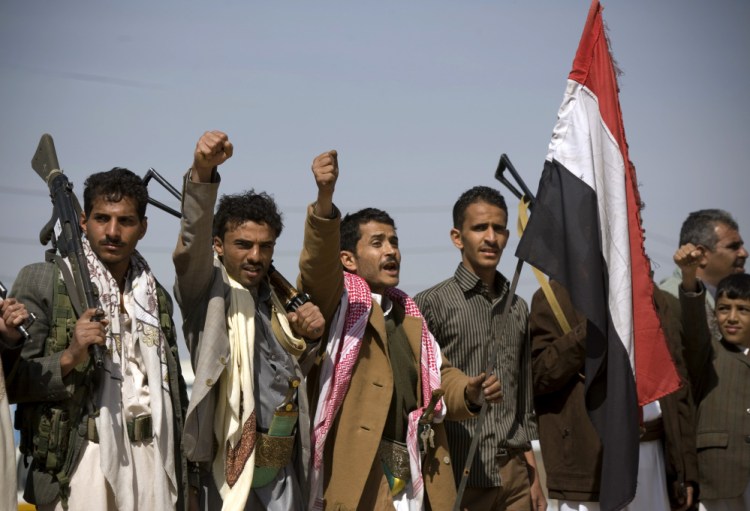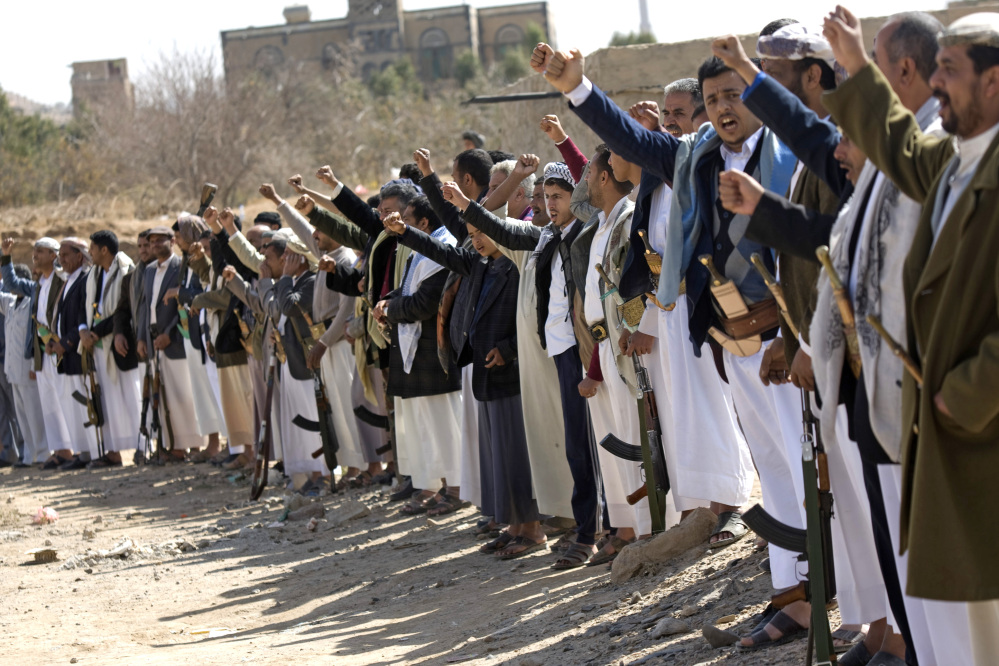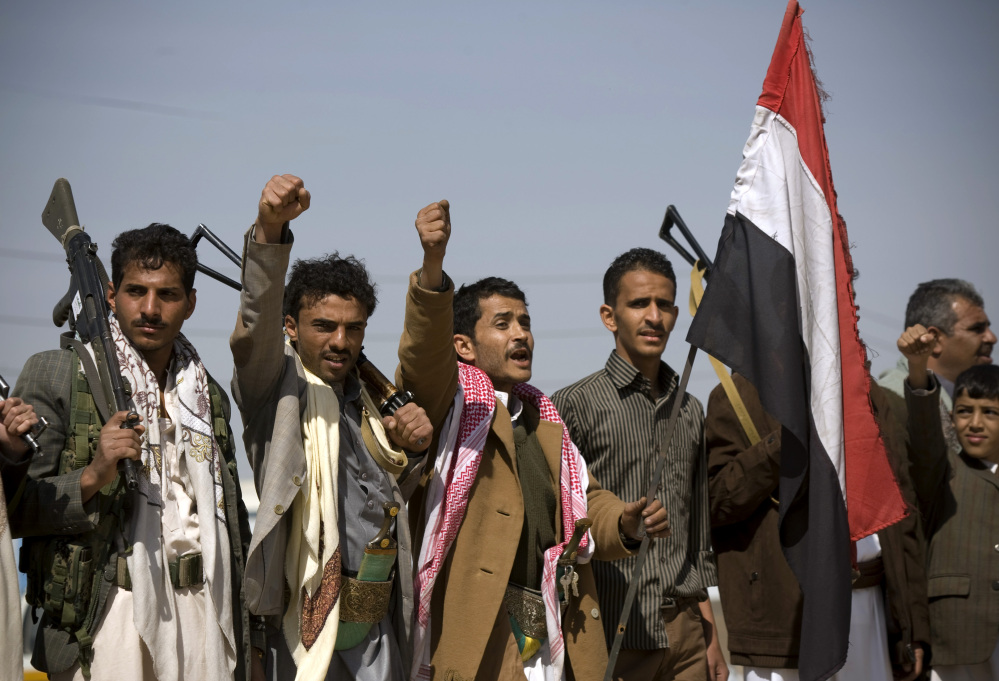SANAA, Yemen — Intense clashes erupted Monday in the Yemeni capital amid an apparent push by Houthi insurgents to seize more power from the country’s embattled president, Abed Rabbo Mansour Hadi, a key U.S. ally against al-Qaida.
Witnesses described plumes of smoke and deserted streets across Sanaa as government security forces battled the insurgents in clashes that were especially heavy near the presidential palace. The Houthi, followers of the Zaydi branch of Shiite Islam, seized the city in a surprise attack in September and have consolidated power in a southward advance that threatens to further destabilize an impoverished country already beset by multiple conflicts.
In the most serious fighting in the capital since the September assault, Houthi fighters seized Yemen’s state television network and the state-run news agency, Saba, early Monday and were seen by witnesses surrounding the central bank, the Defense Ministry and, later, the prime minister’s residence.
Saudi Arabia and other Sunni nations accuse the Shiite Houthis of being steered by Iran, a Shiite nation that is the traditional enemy of Riyadh. That claim is rejected by the Houthi, who have waged a rebellion centered in Yemen’s northern province of Saada since 2004, alleging government discrimination.
The whereabouts of Hadi, who does not live in the presidential palace, remained unclear late Monday.
Two cease-fires were declared that failed to stop the fighting. One was announced on Monday morning by Information Minister Nadia Sakkaf, but it did not take hold, and the sounds of artillery and heavy machine-gun fire continued to reverberate across the city.
Houthi fighters were also seen moving on the prime minister’s palace hours after a second cease-fire was announced by the Saba news agency, which reported that a committee of advisers to the president had agreed to a truce. The news agency appeared to be under Houthi control when the second truce was announced.
Earlier, Sakkaf went on satellite television to warn Yemenis that broadcasts by Saba were not sanctioned by the government. She also told the Associated Press that the attacks were a “step towards a coup” by Houthi fighters.
Sakkaf’s warning of a possible overthrow attempt came as a convoy transporting the prime minister, Khaled Bahah, came under attack by gunmen while leaving the president’s house earlier in the day. There were no reports of injuries.
On Saturday, Houthi militants abducted Hadi’s chief of staff, Ahmed Awad bin Mubarak, who has been tasked with helping to draft a new constitution. The document includes measures that are opposed by the Houthi, who make up just under a third of Yemen’s population of about 24 million.
“My house is shaking because of the heavy explosions, and I am unable to leave the house,” Ahmed al-Yaabori, 32, said by telephone on Monday morning from his home near the presidential palace. The shooting started at 7 a.m. and intensified, he said.
“The street outside my house is empty, and it is not safe at all,” he said.
The fighting is the latest bout of unrest that threatens to undermine a political transition that brought Hadi to power in 2012 after a popular uprising that ousted the country’s longtime president, Ali Abdullah Saleh. Critics accuse Saleh of collaborating with Houthi insurgents to undermine Hadi, who has attempted to lead a reform process that has failed in the eyes of many Yemenis.
The U.N. Security Council imposed sanctions on Saleh and two Houthi leaders in November, saying they had threatened Yemen’s stability.
The Houthi have portrayed their advance as an attempt to root out corruption. They signed a U.N.-brokered peace deal in September and agreed to form a technocratic government in November, after storming the capital in a move that received backing beyond the group’s traditional support base, in part because of the government’s unpopular decision to lift fuel subsidies in July.
The Houthi fighters were supposed to withdraw from Sanaa under the September agreement, but they refused, citing a need to provide security.
They have also clashed with radicals from al-Qaida in the Arabian Peninsula, or AQAP, which has stoked fears of rising sectarian tension with the country’s Sunnis. The militant group has staged a number of deadly attacks against Houthi targets, including a suicide bombing at a police academy in the capital this month that killed dozens of people.
Hadi is seen as an important ally in U.S. attempts to counter AQAP, including multiple drone attacks that have killed militants as well as civilians. Those attacks have intensified under Hadi’s authority, angering many in Yemen.
There are fears that Yemen is verging on becoming a failed state because of its conflicts and other issues, such as a serious scarcity of water. The Houthi assault has raised concern that separatists in the country’s south could also call for more autonomy.
Washington Post correspondent Hugh Naylor reported from Beirut.
Copy the Story LinkSend questions/comments to the editors.





Success. Please wait for the page to reload. If the page does not reload within 5 seconds, please refresh the page.
Enter your email and password to access comments.
Hi, to comment on stories you must . This profile is in addition to your subscription and website login.
Already have a commenting profile? .
Invalid username/password.
Please check your email to confirm and complete your registration.
Only subscribers are eligible to post comments. Please subscribe or login first for digital access. Here’s why.
Use the form below to reset your password. When you've submitted your account email, we will send an email with a reset code.